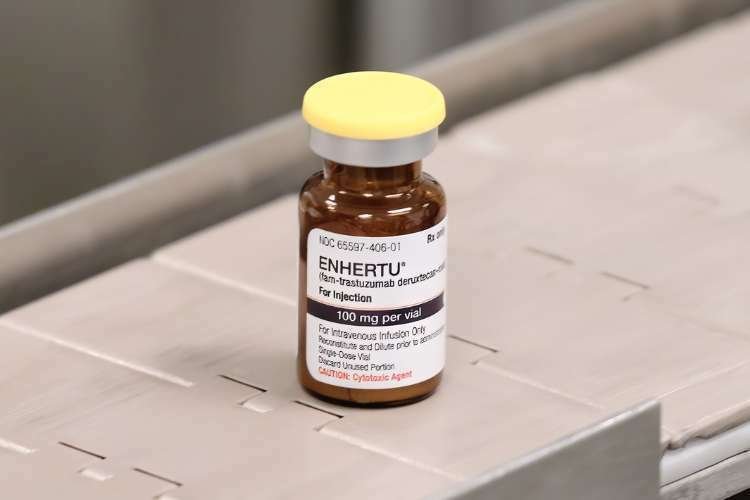The International Association for the Study of Lung Cancer (IASLC) presented pivotal results from the DESTINY-Lung02 Phase II trial at its 2023 World Conference on Lung Cancer. This in-depth research, concurrently spotlighted in the esteemed Journal of Clinical Oncology, offers hope to those with previously treated HER2-mutant (HER2m) non-squamous non-small cell lung cancer (NSCLC), an area longing for advancement.
Enhertu, a cutting-edge HER2-directed antibody drug conjugate (ADC) fashioned meticulously by pharmaceutical giants AstraZeneca and Daiichi Sankyo, is the star of this trial. Notably, it’s not just the effectiveness of Enhertu that has turned heads but its capability to sustain robust tumor responses in this challenging patient cohort.
A glance at the numbers underscores its potency:
- The trial observed a remarkable objective response rate (ORR) of 49.0% in the 5.4mg/kg dosage and an even more impressive 56.0% in the 6.4mg/kg dosage. Notably, these numbers were vetted by a blinded independent central review (BICR), ensuring unbiased evaluation.
- Safety, an equally pivotal concern, wasn’t compromised. Both dosages harmonized with Enhertu’s overarching safety profile. In fact, the 5.4mg/kg dosage showcased an especially favorable safety spectrum.
The secondary findings further buoy optimism:
- Median progression-free survival (PFS) clocked in at 9.9 months for the 5.4mg/kg arm and a substantial 15.4 months for the 6.4mg/kg arm.
- Median overall survival (OS) data spotlighted 19.5 months for the 5.4mg/kg arm, with the 6.4mg/kg arm still in the race as the study continues.
However, like all great tales in the pharma realm, there’s a cautionary chapter. Treatment-related adverse events (TEAEs) of Grade 3 or higher were recorded at 38.6% for the 5.4mg/kg dosage and 58.0% for the 6.4mg/kg dosage. The most recurrent of these were neutropenia and anaemia.
Furthermore, there were instances of treatment-associated interstitial lung disease (ILD) or pneumonitis, though the majority were low-grade events, suggesting manageable side effects.
Summary of results: DESTINY-Lung02 Primary analysis
| Efficacy Measure | Enhertu (5.4mg/kg) n=102 | Enhertu (6.4mg/kg) n=50 |
| Confirmed ORR (%)(95% CI)i | 49.0% (39.0-59.1) | 56.0% (41.3-70.0) |
| Complete Response (%) | 1.0% | 4.0% |
| Partial Response (%) | 48.0% | 52.0% |
| Stable Disease (%) | 44.1% | 36.0% |
| Progressive Disease (%) | 3.9% | 4.0% |
| Not Evaluable (%)ii | 2.9% | 4.0% |
| DCR (95% CI) iii | 93.1% (86.4-97.2) | 92.0% (80.8-97.8) |
| Median DoR (months)(95% CI)iv,v | 16.8 (6.4-NE) | NE (8.3-NE) |
| Median TTIR (months) (95% CI)iv | 1.8 (1.2-7.0) | 1.6 (1.2-11.2) |
| Median PFS (months)(95% CI)iv,vi | 9.9 (7.4-NE) | 15.4 (8.3-NE) |
| Median OS (months)(95% CI)vii | 19.5 (13.6-NE) | NE (12.1-NE) |
CI, confidence interval; DCR, disease control rate; DoR, duration of response; NE, not estimable; ORR, objective response rate; OS, overall survival; PFS, progression free survival; TTIR, time to initial response
Data cutoff: As of 23 December 2022
i Proportion of patients with confirmed CR or PR assessed by BICR per RECIST v1.1
ii Three patients were NE at 5.4mg/kg (one patient never received treatment due to COVID-19; two patients discontinued before first tumour assessment); two patients were NE at 6.4mg/kg (discontinued due to adverse event before first tumour assessment).
iii Proportion of patients with confirmed CR, PR, or SD assessed by BICR
iv Assessed by BICR
v 60.0% and 75.0% of patients in the 5.4 mg/kg and 6.4 mg/kg arms were censored
vi 56.9% and 60.0% of patients in the 5.4 mg/kg and 6.4 mg/kg arms were censored
vii 63.7% and 72.0% of patients in the 5.4 mg/kg and 6.4 mg/kg arms were censored
Official Statement
“The primary results from DESTINY-Lung02 demonstrate that Enhertu continues to show strong and durable tumour responses for patients treated at either dose. The favourable safety profile seen at the 5.4mg/kg dose continues to support the use of Enhertu in the treatment of patients with HER2-mutant non-small cell lung cancer, a particularly aggressive form of the disease where patients face a poor prognosis and have historically had few options.”
– Pasi A. Jänne, MD, PhD, Director, Lowe Center for Thoracic Oncology and Belfer Center for Applied Cancer Science, Dana-Farber Cancer Institute, US
“These results from DESTINY-Lung02 highlight that HER2 is an actionable target in lung cancer and reinforce the importance of testing for predictive biomarkers, including HER2 alterations, at the time of diagnosis to accurately identify patients who may be able to benefit from a targeted treatment. The data also reaffirm our belief in Enhertu as a potential new targeted treatment option for patients who have historically had limited options.”
– Susan Galbraith, Executive Vice President, Oncology R&D, AstraZeneca
“The disease control achieved by more than 90% of patients with previously treated HER2-mutant non-small cell lung cancer in the primary analysis of DESTINY-Lung02 reinforces the efficacy we have already seen with Enhertu in this hard-to-treat disease. These results, along with encouraging progression-free survival and overall survival findings reported for the first time, demonstrate the potential role of Enhertu as an important treatment option for this patient population.”
– Ken Takeshita, Global Head, R&D, Daiichi Sankyo





























